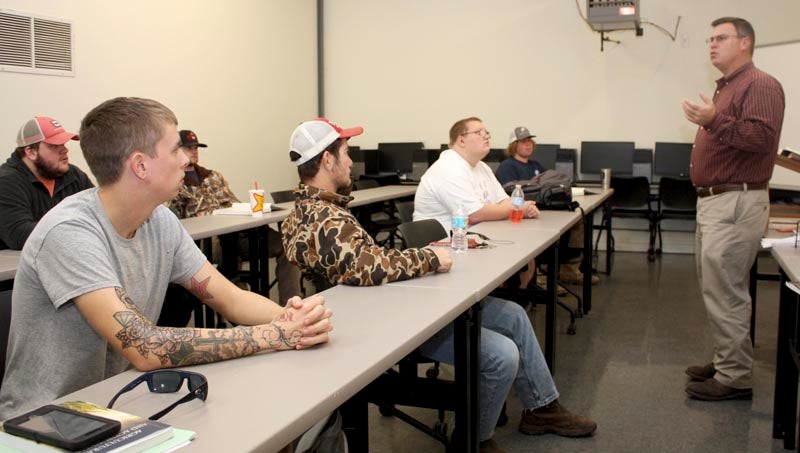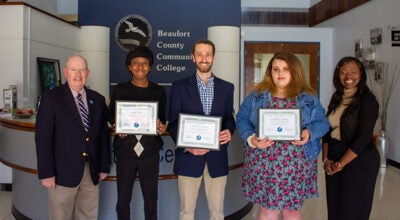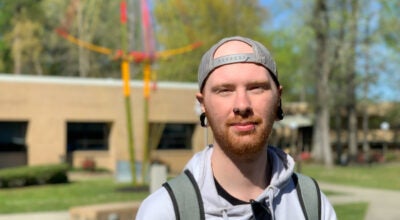Agribusiness students succeed close to home
Published 3:40 pm Tuesday, February 7, 2017

- GROWING THE FUTURE: Agribusiness students (from left) Billy Harding, Danny Howard, Matthew Greene and Joseph Spencer listen to instructor Billy Askew during a class at BCCC.
The best place to get an education in agribusiness might not always be the heart of a big city like Raleigh, as a number of students at Beaufort County Community College have found.
The students, many of them taking over family operations in Beaufort, Hyde and Tyrrell counties, found that they can get the same training and knowledge through an atmosphere that felt closer to home.
“We’re used to going to high schools with smaller class sizes,” said Billy Harding, who attended North Carolina State University, but returned to BCCC. “You have 200 people in a class with you (at N.C. State). I grew up on a farm. I was not used to city life.”
Harding’s family owns Southside Farms in Beaufort County, which grows both produce, such as strawberries and blackberries, and 1,000 acres of row crops, such as corn and soybeans. He has found it easier to learn in the smaller, family environment at BCCC.
At BCCC, students can build a relationship with agribusiness technology instructor Billy Askew.
Beaufort County resident Danny Howard found himself in a similar situation.
“(At N.C. State), you might be in classes from 8 in the morning to 6 in the afternoon,” he said. “You can work on your own schedule here.”
Howard works in landscaping locally. The agribusiness program at BCCC allows him to continue working while attending classes. Enrolling in the program at the community college also means that students can save a significant amount of money compared to attending N.C. State.
Agribusiness involves many more components than just growing crops. Beaufort County resident Matthew Greene is interested in being a grain silo operator. He is also looking at managing places such Crop Production Services operation like his father does, selling chemicals and seed to farmers.
Hyde County resident Tanner Equils has already graduated from BCCC’s fire academy and paramedic program. In the past, Equils had worked in aquaculture on an oyster farm. Now, he plans to round out his career with a job in seed sales.
Students are also looking to the future. Harding’s family transitioned away from tobacco.
He plans to decrease the amount of row crops they grow, converting some of his acreage to organic hogs, grass-fed cattle and more produce to satisfy the market for locally grown foods.
Agribusiness is the primary industry in BCCC’s service area, making it a good option for local students.
Greene said, “There’s always going to be a need for agriculture. The world’s population is growing, so you will need to grow more food for all those people.”
However, it is not always a parent’s first choice for a child’s career. Howard and Equils were both questioned by their families when they announced their interest in agribusiness careers.
Equils’s father asked him, “Are you sure you want to run a farm?”
In Howard’s case, he had family members go to Duke University, UNC-Chapel Hill and East Carolina University for an assortment of careers.
“You have to do what you enjoy. If you’re not happy, it’s not worth it,” Howard said.
BCCC’s agribusiness technology program was created in 2014 in response to demand from students and employers in the college’s four-county service area, whose economy depends heavily on agriculture. A grant from the Golden LEAF Foundation supported the program during its first two years.
The associate in applied science degree in agribusiness technology covers a broad range of topics including accounting, business and management. For students who want to continue their education, BCCC has partnered with the University of Mount Olive to offer a four-year agribusiness degree.
Askew gets calls from local employers asking for qualified students regularly. One graduate from his program works at Simply Natural Creamery in Pitt County. Askew’s connection led Harding to a job at a seedling nursery with International Forest Co.
The personal attention from Askew means that these students will have the tools they need, in an environment close to home, to keep the agribusiness sector strong and moving forward.
For more information about the agribusiness technology program, contact Billy Askew at 252-940-6304 or billy.askew@beaufortccc.edu.




